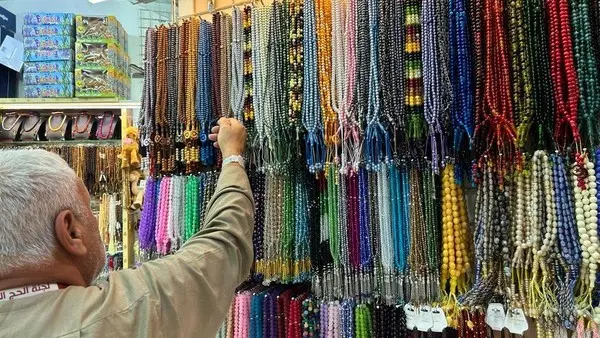

Pilgrims' gifts enliven the central area of Mecca
The movement of buying and selling gifts has become active in Mecca, with the influx of about 3 million pilgrims to perform the Hajj rituals, as many of them are keen to bring gifts, especially those related to the Holy Kaaba and the Grand Mosque, in addition to perfumes, clothes, and Zamzam water, which constitute the largest share of sales.
The guests of God are keen to buy souvenirs from Mecca, especially in the central area around the Holy Mosque, whose stores have worked since early on to provide suitable gifts for pilgrims, ranging from electronic gifts, gifts of clothing, prayer beads, pictures of the Two Holy Mosques, recordings of the Holy Qur’an from the Grand Mosque, and some Meccan sweets, as well as water. Zamzam is the most requested gift by pilgrims.
Crystal models that embody the Two Holy Mosques in Mecca and Medina are among the precious gifts. A number of stores also offer digital clocks for the call to prayer from Mecca and wall clocks that include images of the Holy Kaaba and the Two Holy Mosques, in addition to some games that embody images in Mecca.
Meccan and Medina sweets are popular with pilgrims. Pilgrims’ purchases also include Saudi clothes, candles, and the products of Saudi craftswomen, which are closely linked to the atmosphere of Mecca and the holy sites, and attract the attention of many pilgrims.
Gold sales in Mecca are among the most expensive gifts for pilgrims, who benefit from the availability of types of gold jewelry, some of which were manufactured in the Kingdom under trade names that have gained international fame. However, it is noted that the higher prices of gold than they were in previous Hajj seasons led to some decline in pilgrims’ purchases. .
Economic estimates indicate that the purchase of gifts by pilgrims and Umrah pilgrims takes between 10 and 17% of the total budget of the pilgrim or Umrah pilgrim, while this percentage is higher for some pilgrims from high-income countries.
The Saudi Commission for Tourism and Antiquities had launched the national project for the development of crafts and handicrafts, “Barea,” which aims to localize and encourage about 45 craft industries in the Kingdom with the aim of developing the craft industry in the Kingdom, as the Hajj and Umrah seasons and the summer seasons are seasons of great demand for such products.